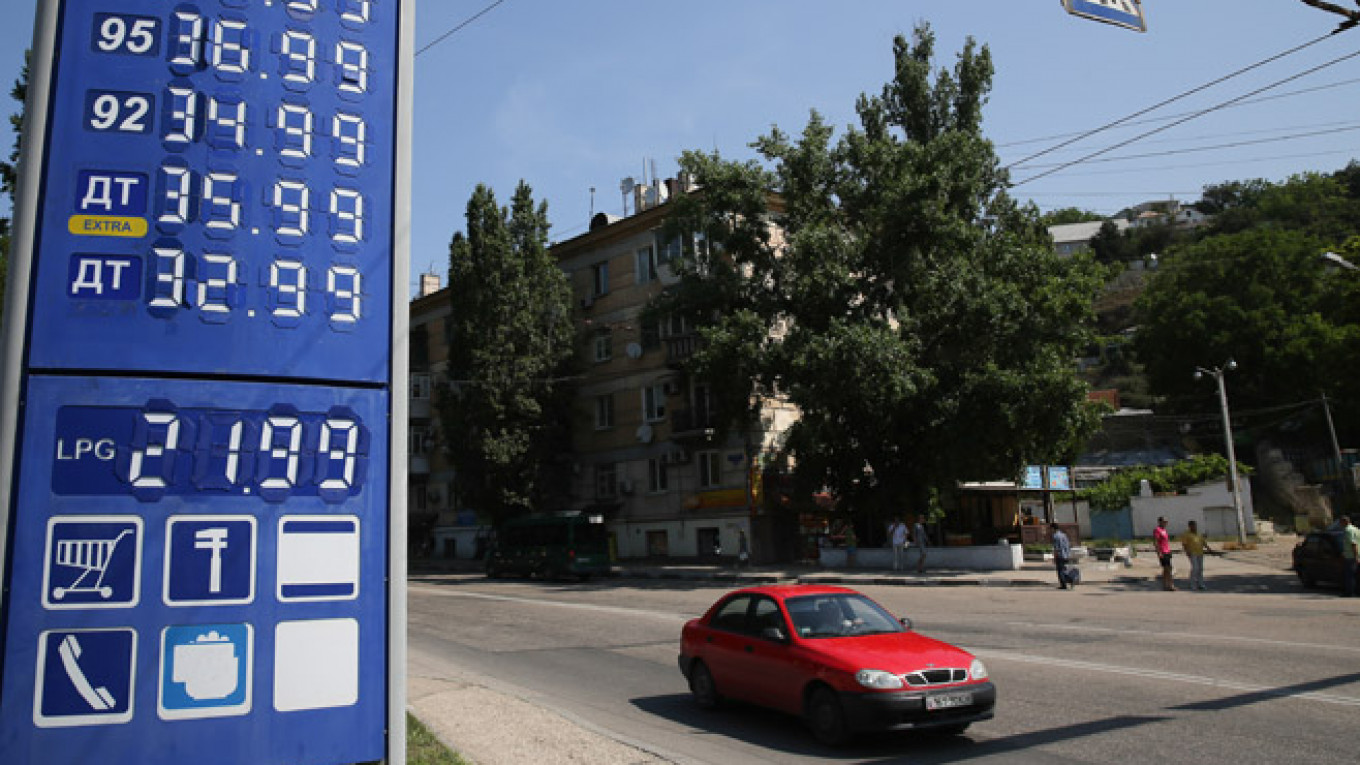Despite a recent dip, gasoline prices in Russia are expected to surge this spring on the back of growing demand, prompting fuel shortages and queues at gas stations, analysts said Tuesday.
Demand for gasoline at pump stations across Russia has declined by more than 10 percent on average since the beginning of the year, and as much as 40 percent at some locations, according to a report released this week by Commodities Markets Analysis, a Moscow-based commodities trade consultancy.
Gas station owners are complaining that demand for fuel, which regularly declines during the winter months, was exceptionally low this January, the report said.
While demand is down, oil companies' output is at normal levels, meaning there is a surplus of supply that is going to storage facilities, pushing down spot prices, said Mikhail Turukalov, the head of business development at Commodities Markets Analysis.
Spot prices for gasoline, which declined slightly in December, fell by 9.5 percent in January.
But the low prices will not hold for long, as companies will likely begin selling gasoline abroad, where prices are much higher, other analysts said.
"Currently the price for gasoline in Russia is the lowest in Europe, which [for Russian consumers] is very dangerous," said Rustam Tankayev, lead analyst at the Russian Union of Oil and Gas Producers.
As plummeting oil prices pushed the ruble down by around 40 percent to the U.S. dollar last year, gas prices in Russia fell by as much as 50 percent in dollar terms. At the beginning of 2014, a liter of premium gas in Russia could be bought for 88 cents. By the end of the year the price was 44 cents per liter.
Out of all developed countries only the United States can boast gasoline prices at around 60 cents per liter. In Germany and France it costs about $1.4 per liter and in Britain — as much as $1.6 per liter.
"Just as demand for fuel picks up [within the country], more gasoline will be shipped out of Russia on top of the declining export duty tax, causing shortages and price hikes," Tankayev said.
In line with the so-called "tax maneuver," passed by the State Duma last year, the export duty tax for gasoline will decrease from $249 per ton in December to $88 per ton in February.
The government is already preparing for the possible fuel price hike. Earlier this month Prime Minister Dmitry Medvedev asked the head of Federal Antimonopoly Service Igor Atemyev to work out proposals to correct the export duty for gasoline "in case these measures will be necessary."
But applying administrative pressure will only result in shortages of gasoline and long lines at gas stations, analysts said.
"If prices are held manually for the domestic market, producers would be even more inclined to sell fuel abroad … and when the pressure is lifted the prices will surge dramatically," said Igor Yushkov, lead analyst at the Moscow-based National Energy Security Fund.
The exact same scenario happened during the 1998 and 2008 crises, when a sudden price hike for gasoline prompted car owners to line up at gas stations that sold fuel cheaper than average. Analysts warn that the rush could be repeated as gasoline prices are expected to grow up to 50 percent by the time the season of high demand begins in May.
Contact the author at a.panin@imedia.ru
A Message from The Moscow Times:
Dear readers,
We are facing unprecedented challenges. Russia's Prosecutor General's Office has designated The Moscow Times as an "undesirable" organization, criminalizing our work and putting our staff at risk of prosecution. This follows our earlier unjust labeling as a "foreign agent."
These actions are direct attempts to silence independent journalism in Russia. The authorities claim our work "discredits the decisions of the Russian leadership." We see things differently: we strive to provide accurate, unbiased reporting on Russia.
We, the journalists of The Moscow Times, refuse to be silenced. But to continue our work, we need your help.
Your support, no matter how small, makes a world of difference. If you can, please support us monthly starting from just $2. It's quick to set up, and every contribution makes a significant impact.
By supporting The Moscow Times, you're defending open, independent journalism in the face of repression. Thank you for standing with us.
Remind me later.






